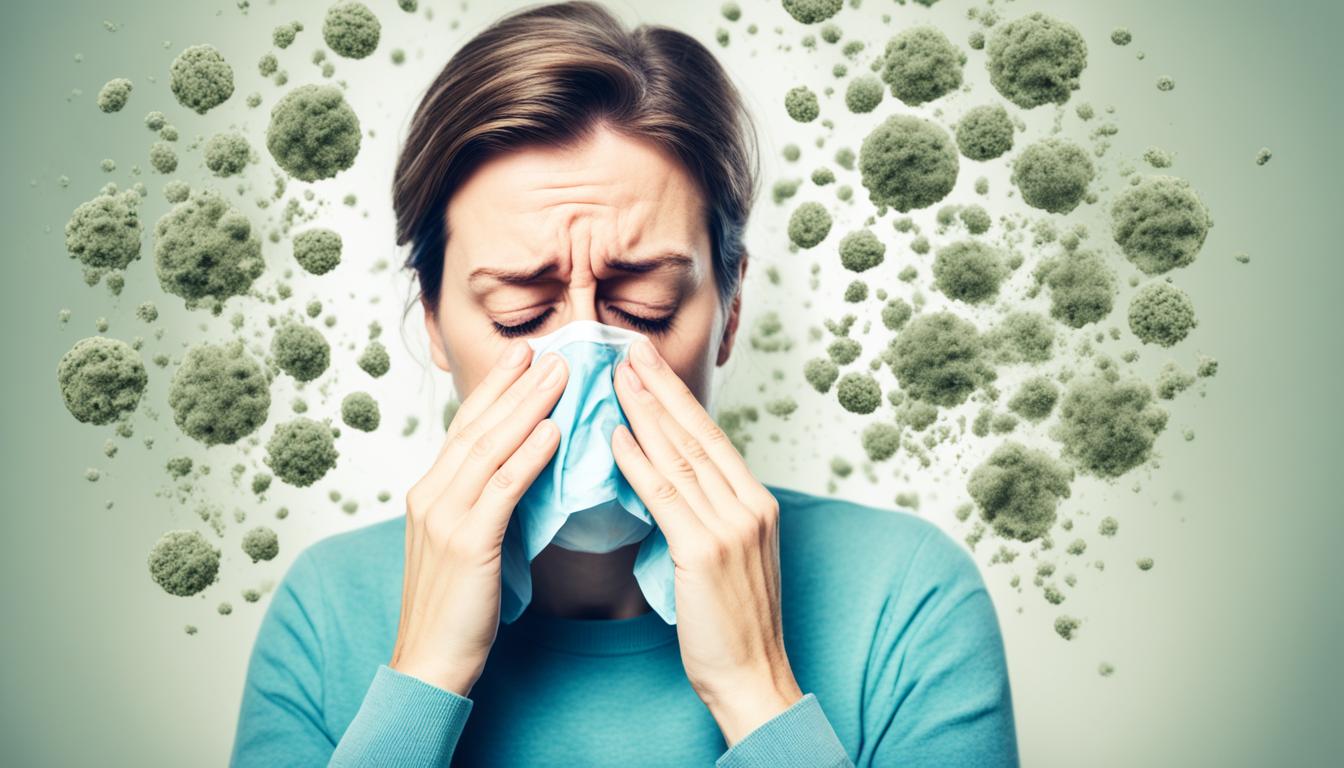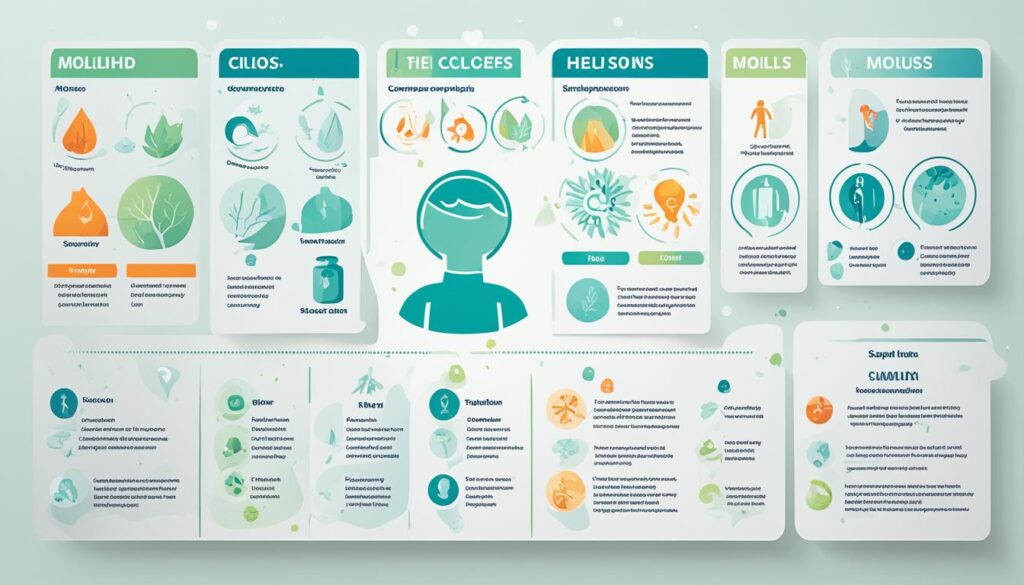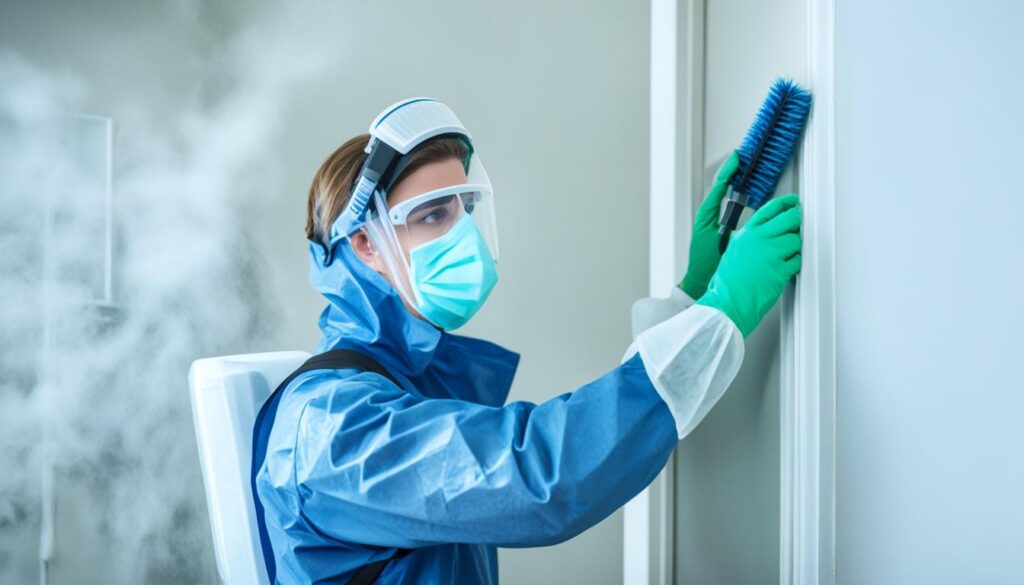
Mold Exposure Symptoms in Adults: Know the Signs
Mold exposure can have adverse effects on our health, particularly in adults. Being aware of the symptoms associated with mold exposure is essential in order to identify potential health implications and take appropriate action. In this section, we will explore the various signs that adults may experience due to mold exposure. By understanding these symptoms, you can protect your wellbeing and seek the necessary medical attention.
Key Takeaways:
- Adults may experience a range of symptoms as a result of mold exposure.
- Common signs include respiratory issues, allergic reactions, and neurological symptoms.
- It is crucial to seek medical attention if you experience these symptoms.
- Preventive measures, such as improving ventilation and reducing moisture, can help minimize the risk of mold exposure.
- Consulting with professionals, such as Fix Mold Miami, can provide expert advice and assistance with mold assessments and remediation.
Recognizing Mold Exposure Symptoms in Adults
When it comes to mold exposure, recognizing the symptoms in adults is crucial for addressing potential health concerns. Mold, a common household problem, can lead to various health issues when exposed to for extended periods of time. By understanding the specific symptoms associated with mold exposure in adults, you can seek proper medical attention and take appropriate action to protect your wellbeing.
Common Symptoms:
- Respiratory Issues: Persistent coughing, wheezing, and shortness of breath.
- Allergic Reactions: Sneezing, nasal congestion, itchy or watery eyes, and skin rashes.
- Neurological Symptoms: Headaches, dizziness, difficulty concentrating, and memory problems.
- Physical Manifestations: Fatigue, muscle aches and pains, and unexplained weight loss or gain.
Less Common Symptoms:
- Digestive Problems: Nausea, vomiting, diarrhea, and abdominal pain.
- Cardiovascular Issues: Irregular heartbeat, chest pain, and high blood pressure.
- Psychological Effects: Anxiety, depression, mood swings, and irritability.
- Immune System Complications: Repeated infections, weakened immune response, and increased susceptibility to illnesses.
It is important to note that while these symptoms may indicate mold exposure in adults, they can also be associated with other health conditions. If you suspect mold exposure or experience persistent and unexplained symptoms, consult with a healthcare professional for a proper diagnosis.
Mold Exposure Symptoms Infographic:

| Symptom | Description |
|---|---|
| Respiratory Issues | Persistent coughing, wheezing, and shortness of breath. |
| Allergic Reactions | Sneezing, nasal congestion, itchy or watery eyes, and skin rashes. |
| Neurological Symptoms | Headaches, dizziness, difficulty concentrating, and memory problems. |
| Physical Manifestations | Fatigue, muscle aches and pains, and unexplained weight loss or gain. |
| Digestive Problems | Nausea, vomiting, diarrhea, and abdominal pain. |
| Cardiovascular Issues | Irregular heartbeat, chest pain, and high blood pressure. |
| Psychological Effects | Anxiety, depression, mood swings, and irritability. |
| Immune System Complications | Repeated infections, weakened immune response, and increased susceptibility to illnesses. |
Taking Action and Protecting Your Wellbeing
In order to safeguard your health, it is imperative to take proactive steps to counteract mold exposure and protect your overall wellbeing. Implementing preventive measures and promptly addressing any mold issues in your home or workplace can greatly reduce the potential risks associated with mold.
Preventive Measures
To mitigate the likelihood of mold growth, it is essential to focus on improving the ventilation and reducing moisture levels within your living or working environment. These measures can help create an inhospitable environment for mold spores to thrive:
- Proper Ventilation: Ensure proper airflow by using exhaust fans or opening windows in areas prone to moisture, such as bathrooms, kitchens, and basements.
- Moisture Control: Regularly inspect your home or workplace for any signs of dampness or water leaks. Promptly repair any leaks in roofs, pipes, or walls to prevent moisture accumulation.
- Humidity Regulation: Utilize dehumidifiers in areas with high humidity levels to maintain optimal moisture levels.
- Maintain Cleanliness: Regularly clean and dry areas prone to dampness, such as shower curtains, bathroom tiles, and kitchen surfaces.
- Proper Insulation: Ensure proper insulation in walls, ceilings, and floors to prevent condensation and moisture buildup.
Detecting and Addressing Mold Issues
In order to effectively address mold problems, it is crucial to be vigilant and proactive. Prompt action can minimize the potential health risks associated with mold exposure:
- Visual Inspections: Regularly inspect your home or workplace for visible signs of mold, such as discoloration, musty odors, or water stains.
- Mold Testing: Consider professional mold assessments to identify hidden mold growth and determine the extent of the problem.
- Professional Remediation: If mold is detected, engage the services of experienced professionals like Fix Mold Miami to safely and efficiently address the issue.
- Proper Cleaning: If the mold growth is minor, use appropriate cleaning products and protective equipment to remove it. However, for extensive mold infestations or if you have health concerns, it is advisable to seek professional assistance.
Remember, taking appropriate action and protecting your wellbeing should be a priority when it comes to mold exposure. By following the preventive measures and promptly addressing any mold-related issues, you can minimize the risk of mold exposure and maintain a healthy living or working environment.
“The key to protecting your wellbeing lies in proactive measures, timely detection, and professional assistance. Don’t compromise on the health and safety of yourself or your loved ones.”

| Preventive Measures | Detecting and Addressing Mold Issues |
|---|---|
| – Proper Ventilation | – Visual Inspections |
| – Moisture Control | – Mold Testing |
| – Humidity Regulation | – Professional Remediation |
| – Maintain Cleanliness | – Proper Cleaning |
| – Proper Insulation |
Conclusion
In conclusion, mold exposure can have significant health implications for adults. Recognizing the symptoms associated with mold exposure is crucial in order to take appropriate action and protect your wellbeing. Common signs include respiratory issues, allergic reactions, and neurological symptoms, among others.
To safeguard your health and reduce the risks posed by mold, it is important to consult with professionals who specialize in mold assessments, prevention, and remediation. Fix Mold Miami is a trusted expert in this field, offering expert advice and assistance to ensure a healthy living environment.
By implementing preventive measures such as improving ventilation and reducing moisture levels, you can minimize the risk of mold growth in your home or workplace. Additionally, it is vital to stay informed about the potential hazards of mold exposure and stay proactive in addressing any mold-related concerns.
Remember, protecting your wellbeing is paramount. Take the necessary steps to address mold issues, seek professional guidance, and prioritize a healthy living environment free from mold’s adverse effects.




